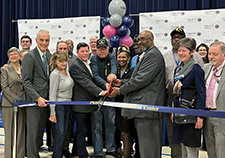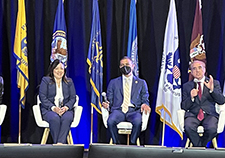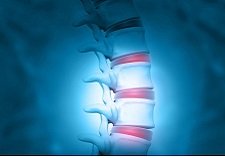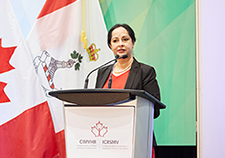Office of Research & Development |
 |


VA's Home-Based Primary Care Program provides care for seriously ill or disabled Veterans who wish to age in place, at home. A VA study found that family members were happier with HBPC when it was combined with community-based hospice services at the end of life. (Photo for illustrative purposes only: @Getty Images/Zoran Zeremski.)
February 7, 2022
By Erica Sprey
VA Research Communications
"We provide home-based primary care with an interdisciplinary team to support a Veteran's choice to age in place, at home."
According to a VA study, families report greater satisfaction with end-of-life care for Veterans dually enrolled in VA's Home-Based Primary Care (HBPC) Program and community-based hospice than those whose loved ones did not receive hospice care.
Researchers at the Corporal Michael J. Crescenz VA Medical Center in Philadelphia analyzed survey data from family members of deceased Veterans who were enrolled in VA's HBPC program. Seven VA regional networks (Veteran Integrated Service Networks or VISNs) participated in data collection between October 2013 and November 2019. The final sample included close to 3,970 Veterans who were enrolled in VA's HBPC program at the time of their death.
When asked about the overall quality of care HBPC-enrolled Veterans received during the last 30 days of life, 53% of family members gave an overall rating of "excellent," using the Bereaved Family Survey (BFS). The global score was eight points higher—56% vs. 47%—for HBPC-enrolled Veterans who also received community-based hospice care. Survey responses were higher on 12 of 14 secondary outcomes for Veterans who received hospice care.

Dr. Ann Kutney-Lee is a core researcher with the VA Center for Health Equity Research and Promotion in Philadelphia. (Photo courtesy University of Pennsylvania, School of Nursing.)
Dr. Ann Kutney-Lee is the associate director of analytics for the Veteran Experience Center, a quality-improvement program within VA's Hospice and Palliative Care Program Office, and a core investigator in VA’s Center for Health Equity Research and Promotion in Philadelphia. She is also an adjunct associate professor of nursing at the University of Pennsylvania. Kutney-Lee is the senior author for the HBPC study published in January 2022 in the Journal of the American Geriatrics Society.
"Nearly two-thirds of Veterans in our sample received hospice in the last 90 days of life. As a comparison, about 50% of patients on Medicare receive hospice," she notes. "I think this speaks to how well the HBPC program does in identifying patients for hospice and connecting them with end-of-life services."
On average, U.S. citizens live well into their seventh decade, despite a decline in longevity during the first year of the COVID-19 pandemic. Advances in medicine mean fewer people are dying from cancer, respiratory diseases, or other serious illnesses. However, with extended life spans, the need for robust geriatric care increases.

VA opens new research center to seek novel arthritis treatments

Under Secretary of Health, panel of experts discusses PACT Act impacts for Veterans

Injectable gel could help treat degenerative back pain

Million Veteran Program director speaks at international forum
For Veterans enrolled in VA health care, the agency offers a range of geriatric services—from VA-run nursing homes to hospital-based services to home-based primary care. The HBPC program supports older Veterans with serious illness or disabilities who wish to remain at home—giving those who qualify access to a range of health services delivered by VA providers in the home.
"Our Home-based Primary Care program is really a cornerstone of many of our geriatric, community-based programs at VA. We provide primary care with an interdisciplinary team to support the most-frail Veterans in our system. We are able to do it in a way that helps to support a Veteran's choice to age in place, at home," says Darlene Davis, who manages VA's HBPC program.
All Veterans who are enrolled in VA health care—including those enrolled in HBPC—have access to hospice care when desired and deemed appropriate. Hospice is indicated for seriously ill people who are expected to live less than six months, and provides patients and family members a range of supportive services to enhance their remaining quality of life.
"The HBPC team works with the Veteran and caregivers to let them know what resources are available. It is absolutely the Veteran and caregiver's choice to bring in hospice or not. We encourage the HBPC program to support that collaboration and bring in additional services when requested," says Dawn Gilbert, director of operations for the Veteran Experience Center.
The Bereaved Family Survey is sent to the families of every Veteran who dies in an inpatient VA health care setting, including VA medical centers and nursing homes, according to Gilbert. The BFS has been in use in VA since 2008. For the HBPC pilot program, the Veteran Experience Center originally recruited three VISNs to administer the survey to families of Veterans who were enrolled in HBPC at the time of their death. Eventually, that number expanded to seven VISNs.
The survey asks a series of questions designed to evaluate the quality of VA’s end-of-life care. For the HBPC pilot study, the survey was modified slightly to reflect care provided in the home during the last month of life, either by VA providers or VA-funded community care.
To arrive at a global rating of care, the BFS asks: "Overall, how would you rate the care that [s/he] received in the last month of [his/her] life?"
Families of deceased Veterans who were in the HBPC program were asked to rate 14 secondary outcomes, and those scores were compared to HBPC-enrolled Veterans who also received hospice care.
Select BFS scores for HBPC-enrolled Veterans who received hospice care vs. no hospice
Overall, family members of HBPC-enrolled Veterans who received hospice care reported better care and support than those whose loved ones were not enrolled in hospice care, with the exception of pain management. The researchers suggested that a lower pain-management score for HBPC-enrolled Veterans who received hospice care could reflect a greater level of symptom severity in that group. Very often, people who seek out hospice care are experiencing a greater intensity of symptoms related to their disease, like intractable pain.
"Hospice is a team approach to care that promotes quality of life and manages pain and other symptoms that can emerge at the end of life, as well as providing psychological, emotional, spiritual, and social support to Veterans and their families. Hospice is designed for patients who are in the end stages of their illnesses' trajectory," says Kutney-Lee.
The Veterans Experience Center (VEC) is a quality-improvement program that strives to improve the care provided for seriously ill Veterans within the VA health care system. The center maintains a robust database containing Veterans’ clinical and demographic characteristics, process measures, and BFS outcomes. Researchers may access VEC data, with approval, for use in health services research.
The VEC team has analyzed thousands of comments made by family members who have completed the BFS, according to Gilbert. Using this data, the center develops Brief Practice Guides for VA leadership, clinicians, and staff that feature topics developed from the BFS. The practice guides cover several domains of care: communications domain, emotional-spiritual domain, and VA benefits domain, among others.
"Any of the teams within VA, like primary care, can access the practice guides and create quality improvement initiatives around them. Essentially, they are the voice of our Veterans and their families," says Gilbert.
VA Research Currents archives || Sign up for VA Research updates